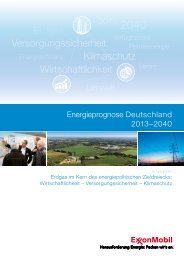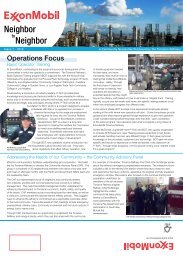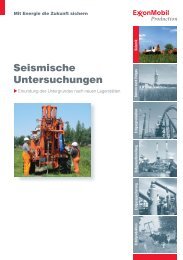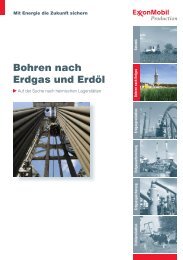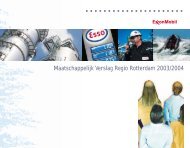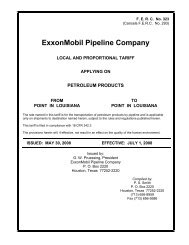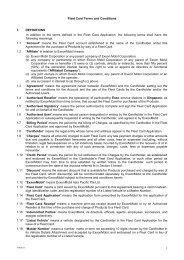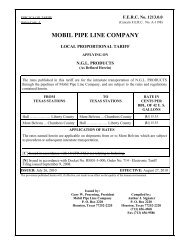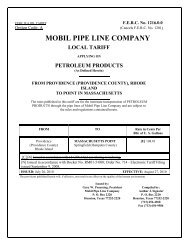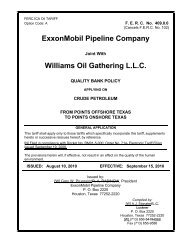The Lamp - ExxonMobil
The Lamp - ExxonMobil
The Lamp - ExxonMobil
Create successful ePaper yourself
Turn your PDF publications into a flip-book with our unique Google optimized e-Paper software.
West Africa update<br />
15<br />
Angolan project<br />
brings gains in oil production, use of<br />
local resources and worker safety<br />
<strong>The</strong> successful startup of two more fields in <strong>ExxonMobil</strong>’s Kizomba C<br />
development off the West African coast has brought on vital additions of<br />
oil for a world whose energy needs are growing. <strong>The</strong> path to this accomplishment<br />
includes maximizing local content and a coordinated effort to<br />
improve worker safety among each of the project’s major contractors.<br />
Ninety miles off the coast<br />
of Angola, Kizomba C is<br />
<strong>ExxonMobil</strong>’s largest subsea oil<br />
project. It comprises three fields:<br />
Mondo, which came on stream<br />
in January 2008, and Saxi and<br />
Batuque, which began production<br />
this summer. It’s designed to<br />
develop 600 million barrels of oil.<br />
<strong>The</strong> development includes<br />
two floating production, storage<br />
and offloading (FPSO) vessels<br />
and 36 subsea wells.<br />
<strong>ExxonMobil</strong>, operator with a<br />
40 percent interest, was awarded<br />
Block 15, where Kizomba C is<br />
located, in 1994. <strong>The</strong> first discovery<br />
occurred in 1998. Sonangol,<br />
the Angolan national oil company,<br />
is concessionaire, and other participants<br />
include BP Exploration<br />
(Angola) Limited 26.67 percent,<br />
ENI Angola Exploration B.V. 20<br />
percent and Statoil Angola Block<br />
15 A.S. 13.33 percent.<br />
<strong>The</strong> twin FPSO vessels are the<br />
fourth and fifth production hubs<br />
Story by Bill Corporon<br />
on Block 15, where production<br />
reached a total of 700,000 barrels<br />
a day in August 2008.<br />
Startup of the Saxi and<br />
Batuque fields in Angola’s prolific<br />
Block 15 follows other <strong>ExxonMobil</strong><br />
projects that began producing<br />
in 2008, including Kizomba C<br />
Mondo (Angola), Volve (Norway),<br />
Starling (UK), ACG Phase 3<br />
(Azerbaijan) and East Area Natural<br />
Gas Liquids II (Nigeria).<br />
Maximizing local resources<br />
In developing Kizomba C,<br />
<strong>ExxonMobil</strong> has spent nearly<br />
$1.5 billion on Angolan goods<br />
and services as part of the<br />
company’s national content program.<br />
<strong>The</strong>se purchases include<br />
contracts for in-country services<br />
and training and development of<br />
Angolan personnel.<br />
For example, four local<br />
companies were selected to<br />
provide in-country fabrication<br />
expertise for such components<br />
as manifolds, mooring systems<br />
and FPSO turret structures.<br />
<strong>The</strong>se and other elements were<br />
transported from Angola to the<br />
Keppel Shipyard Limited facility<br />
in Singapore for assembly and<br />
integration into the FPSOs.<br />
In addition to purchasing equipment<br />
and fabrication services from<br />
Angolan companies, <strong>ExxonMobil</strong><br />
continued a longstanding practice<br />
of hiring and training Angolan<br />
engineers and other personnel –<br />
a practice established by the<br />
company long before production<br />
began from Kizomba C.<br />
A notable example was a new<br />
training initiative for the Kizomba<br />
C project that leveraged its contractors<br />
to provide training of<br />
Angolans in fabrication and operations-type<br />
assignments. During<br />
a two-year period, 75 employees<br />
from Angolan companies were<br />
given the opportunity to develop<br />
new skills. Many traveled to the<br />
Keppel Shipyard, where they<br />
Photo by Keith Wood<br />
Kizomba C involves the development of<br />
600 million barrels of oil from three fields<br />
using 36 subsea wells and two floating<br />
production, storage and offloading vessels,<br />
one of which is pictured above.<br />
received hands-on training in<br />
fabrication and project management<br />
skills. This included experiences<br />
in safety planning, welding,<br />
scheduling and contracting.<br />
Another 50 Angolans were<br />
trained to support and operate<br />
the FPSOs through courses<br />
provided in the United Kingdom<br />
and other European countries as<br />
well as South Africa.<br />
In turn, they brought their new<br />
skills home to Angola and, by<br />
sharing them with colleagues,<br />
helped spread knowledge and<br />
technology in the indigenous<br />
work force.<br />
“<strong>ExxonMobil</strong> is committed<br />
to developing national content<br />
and local companies wherever<br />
we operate in the world,” says<br />
Mike Flynn, vice president for




